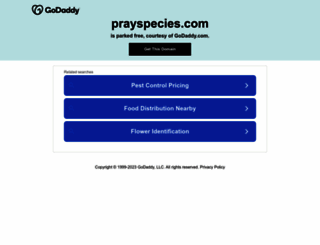Page Load Speed
7.9 sec in total
First Response
1.8 sec
Resources Loaded
4.9 sec
Page Rendered
1.2 sec

About Website
Welcome to prayspecies.com homepage info - get ready to check Prayspecies best content for United States right away, or after learning these important things about prayspecies.com
Stress Less, Pray More
Visit prayspecies.comKey Findings
We analyzed Prayspecies.com page load time and found that the first response time was 1.8 sec and then it took 6 sec to load all DOM resources and completely render a web page. This is a poor result, as 75% of websites can load faster.